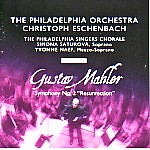Christoph Eschenbach’s failed career in Philadelphia doesn’t come as a surprise. As an interpreter, he takes big risks and can be wildly inconsistent. His current fetish for slow tempos and highly inflected phrasing recalls Sinopoli (and several other conductors I could name), but when his ideas pay off, the rewards are substantial. So it is here. Actually, this performance isn’t all that slow, save in the second movement and the choral half of the finale. In both cases, Eschenbach justifies his choice of speed with loving but never excessively mannered shaping of the melodies in the former case, and in the mesmerizing, mystical atmosphere he creates in the latter. He’s assisted by excellent singers, particularly Yvonne Naef, who turns in one of the finest accounts of the fourth movement (“Urlicht”) on disc.
The first movement has a rugged intensity that recalls Klemperer, and the insanely powerful, crushing brass chords that usher in the recapitulation have to be heard to be believed. Here is another case where taking a risk pays off: Eschenbach really slams on the brakes here, and if you’re going to do that the brass had better blow their collective lips off–and so they do. The very slow but overwhelming percussion crescendo in the finale offers another example of exactly the same tactic. Actually, the first (instrumental) half of the finale doesn’t drag at all, and the concluding chorus really does deliver the goods thanks in large part to the weighty and perfectly balanced presence of the organ.
The live sonics are a bit cavernous and a touch low-level, but very rich in the bass and nicely complementary to the atmospherics of the performance as a whole. The soft tam-tam in the first movement (and elsewhere) is excellently caught, for example, but the cymbals are oddly off-mike, and this robs some of the climaxes of the power that Eschenbach is clearly conjuring from everyone else. In all other respects, though, the playing of the Philadelphia Orchestra is pretty outstanding: rich strings, gutsy brass (as already suggested), and poetic winds (solo oboe particularly). Ultimately, with so many choices available at such a high level of interpretive and technical accomplishment, the question nowadays is not so much whether this is “the best” Mahler 2 available, but rather, does it offer enough special moments to reward repeated listening. Yes, it does.
































